Unit 6: Study skills and writing
Key Unit Competence: To use language learnt in the context ofStudy Skills and Writing.
Introductory activity: Observe and interpret the picture below.

In Unit 2, we discussed educational ambitions and career choices.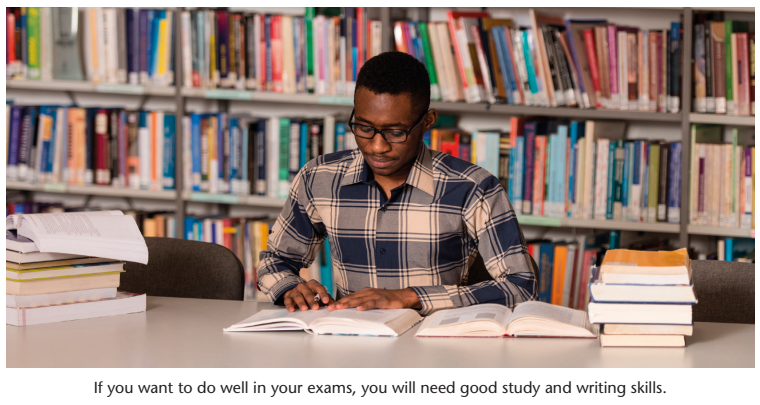
We discovered that, if you want to study further after you leave
school, you need to choose the correct subjects for your careerchoice. You also have to get good grades.
Many people work very hard but do not achieve good grades
because they do not have the right study skills. They also do not
always know how to write correctly and answer examinationquestions in the right way.
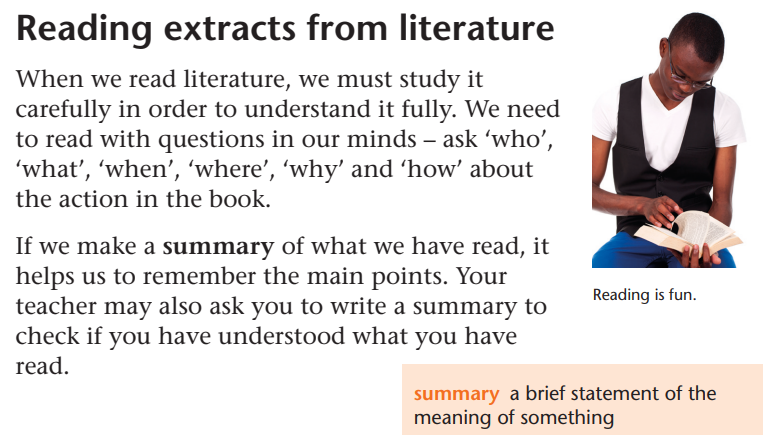
Grammar focus
How to write a summary
When you write a summary, you must remember to keep it very short and to
the point.
• Do not rewrite the original piece.
• Use your own wording.
• Make sure you refer to the central and main ideas of the original piece.
• Do not put in your opinion of the issue or topic discussed in the original
piece.
• Write it always in the form of a ‘prose”.• Give it always an individual title.
Read about storks
Read the following text silently on your own.
Storks do not sing. They make a noise like someone clapping their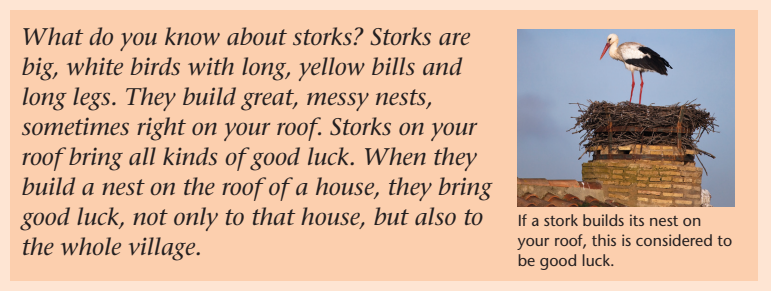
hands together because they feel happy. I think storks clap their bills
to make the same happy sounds. They clap their bills almost all the
time, except when they are hunting in the marshes and ditches for
frogs and little fishes. Then they are quiet. When they are on yourroof, they are noisy, but it is a happy noise and I like happy noises.
That is all I know about storks; but my aunt in the village of Nati
knows a lot about storks because, every year, two big storks come and
build their nest right on her roof. Storks never come to Shora; they goto all the villages roundabout, but they never come to Shora.
After Lina had finished reading her story, the room was quiet. The teacher
stood there looking very proud and pleased. Then he said, “That was a
fine story, Lina. A very fine composition, and you know quite a lot aboutstorks!”
He turned to big Jella. “Jella,” he said, “what do you know about storks?”
“About storks, Teacher?” Jella said slowly. “About storks – nothing.” He
looked surly and stubborn, because he felt stupid. He thought he ought toexplain.
“You see,” he told the teacher, “I can’t bring them down with mycatapult. I’ve tried and tried, but I just can’t seem to do it.”
The teacher looked startled. “But why would you want to shoot themdown?”
“Oh, I don’t know,” Jella said. He wriggled a little in his seat. He lookedunhappy. “Because they move, I suppose.”
“Oh,” the teacher said. “Pier,” he said, “what do you know aboutstorks?"
“Pier," the teacher said, “if I had asked Dirk first, what would your answer
have been?”
“The same as Dirk’s,” Pier answered promptly.
“Teacher, that’s the trouble with being twins, if you don’t know
something, you don’t know it double.” The teacher and the room likedthat. It made everybody laugh.
“Well, Auka,” the teacher said, “how about you?”
Auka was still chuckling and feeling good about what Pier had said, but
now he looked serious. “All I know is that, if storks make happy noiseswith their bills, like Lina said in her story, then I will also like storks.”
The teacher looked around and said, “Well, Eelka, there in the corner,that leaves only you.”
Eelka thought a while. “I’m like Lina, Teacher; I don’t know much about
storks. But if storks would come to Shora, then I think I would like to learna lot more about storks.”
“Yes, that is true,” the teacher said. “But now, what do you think wouldhappen if we all began to think a lot about storks?”
Adapted from ‘The Wheel on the School’ by Meindert De Jong
Activity 1: Write a summary
After reading the passage, do the following:
1. Pick out the main points from the text and write them down.
2. Write down the features of storks.3. Write a few notes under each of the following headings:

Activity 2: Write a short composition
The previous text used a lot of punctuation. The writer used direct speech,
which contains a number of commas, question marks, inverted commas and full
stops. For example:
• “About storks?” Pier asked. “Nothing.”
• “Dirk?” the teacher said.
• “Just the same as Pier,” Dirk said.
1. Write about 200 words on an interesting lesson that you have attended. You
can use both direct speech and dialogue.
2. Compare your work with that of your classmates to see who has usedpunctuation and grammar correctly.
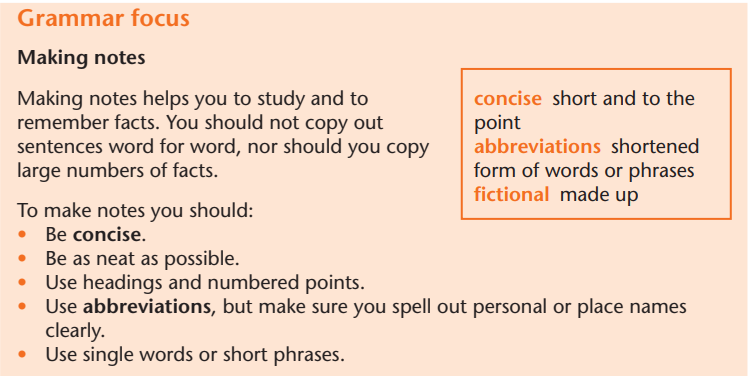
Making notes when reading classic literature
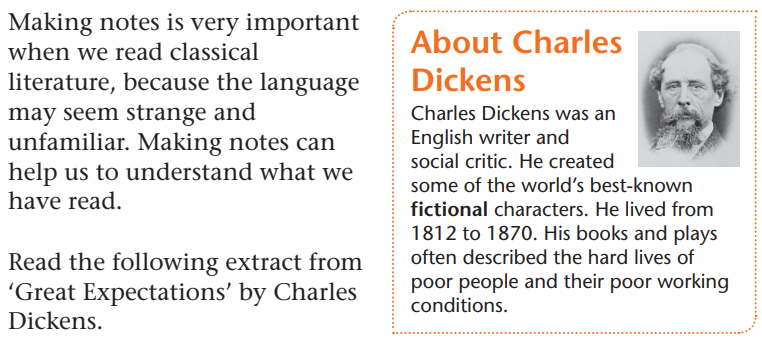
Ours was the marsh country, down by the river, within, as the river
wound, twenty miles of the sea. My first most vivid and broad
impression of the identity of things seems to me to have been gained on
a memorable raw afternoon towards evening. At such a time I found out
for certain that this bleak place overgrown with nettles was the
churchyard; and that Philip Pirrip, late of this parish, and also
Georgiana wife of the above, were dead and buried; and that Alexander,
Bartholomew, Abraham, Tobias, and Roger, infant children of the
aforesaid, were also dead and buried; and that the dark flat wilderness
beyond the churchyard, intersected with dikes and mounds and gates,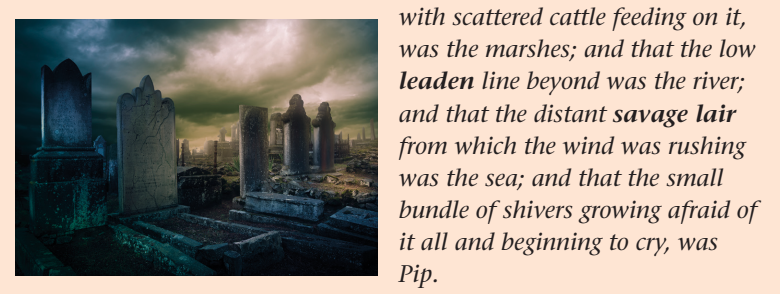
"Hold your noise!" cried a terrible voice, as a man started up from
among the graves at the side of the church porch. "Keep still, you littledevil, or I'll cut your throat!"
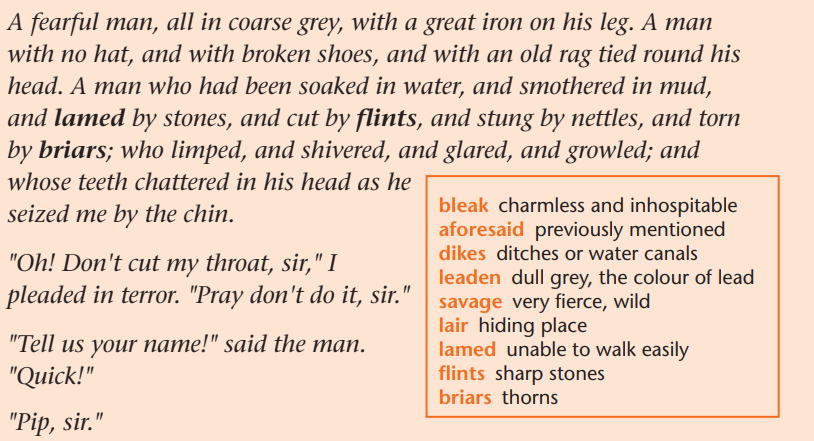
"Once more," said the man, staring at me. "Give it mouth!"
"Pip. Pip, sir."
"Show us where you live," said the man. "Point out the place!"
I pointed to where our village lay, on the flat in-shore among the alder-treesand pollards, a mile or more from the church.

Activity 3: Make notes on an extract from classical literature
In your pairs, carefully reread the extract from ‘Great Expectations’ and make
notes under the following headings:
a) The countryside where Pip met the man
b) The appearance of the fearful manc) How Pip felt when he met the fearful man.
When you work in groups you will be able to:
• Split tasks into parts and steps.
• Plan and manage time.
• Improve your understanding through discussion and
explanation.
• Give and receive feedback on performance.
• Challenge assumptions.• Develop stronger communication skills.
Read about wanting to be head girl
My name is Penny Izabayo. I am in Standard 4. I have never been
punished, or suspended from school because I am always willing to obeythe school rules and regulations.
When you are always punctual, never miss any lessons, wear your school
uniform and respect teachers, you are regarded as a model student.Besides, my academic progress has always been good.
Next term, my school will be electing a new prefect body. I’d like to
compete for the position of head girl. My grades are good and, in
addition, I am a very confident girl and am used to speaking in public.
Because of this, being screened by the staff won’t be a problem. On the
student body side, I am very popular; I help students when they need helpand I welcome newcomers and assist them to settle in.
I should not tell you this, but the other day, a student informed me that I
was wanted in the principal’s office. I went there immediately. When I got
there the principal was not alone, the director of studies, and the head of
the languages department were also there. My heart starting beating veryfast because I could not guess the reason for such a meeting.
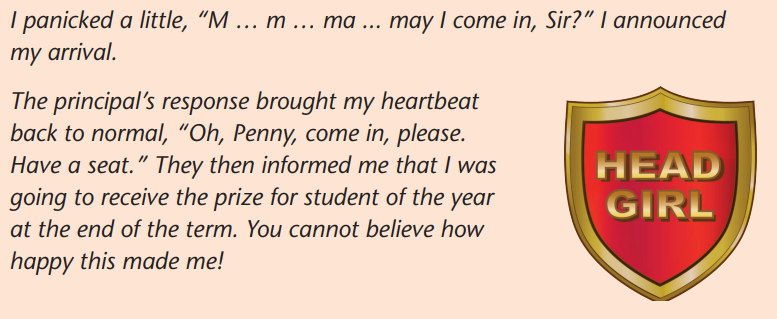
Activity 4: Follow instructions
1. Get into groups of three or four.
2. You will have 15 minutes to complete the activity. Elect a timekeeper. The
timekeeper must tell you when your 15 minutes are up.
3. Read the passage about Penny in your group.
4. In your group, answer the following questions. One person should write
down the group’s answers.
a) What do you learn from Penny?
b) If you were a student in Penny’s school, would you vote for her as your
head girl? Give your reasons.
c) Identify some words or phrases that Penny uses which are also common
in your school environment.
d) Write down some of your school rules and regulations and explain why
they are important.
For example: Missing a lesson without justification is punishable. This
rule helps to make learners attend classes regularly. Therefore, this will
eventually improve the students’ academic performance.
5. At the end of the time, choose a member of your group to report your
answers to the class.6. Compare your group’s answers with those of the other groups.
Reading, interpreting and using instructions
It is important to read instructions and interpret them correctly. If
you do not follow the instruction in an examination question,you will lose marks, no matter how well you know the subject.
For example, you may be given the following instructions:
• Answer in short sentences. • Work with a partner.
• Answer the questions. • Choose a group leader.
• You have five minutes. English.
• Tell the class what you said. • Get ready to report in
Grammar focus
Using headings and numbers
If we are given a page of information with no headings and no numbers, it can
be very difficult to read and understand. We use headings and numbers to make
it easier to sort out information and put it into order. The headings are a kind of
map that helps us to find our way through the information. We can also usesubheadings to break information into more manageable amounts.
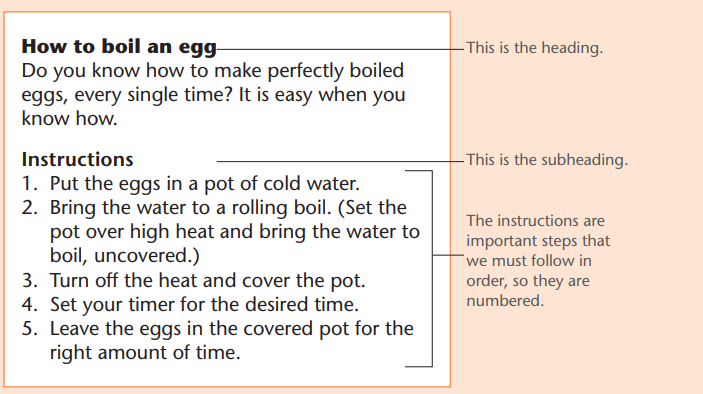
Read about frogs
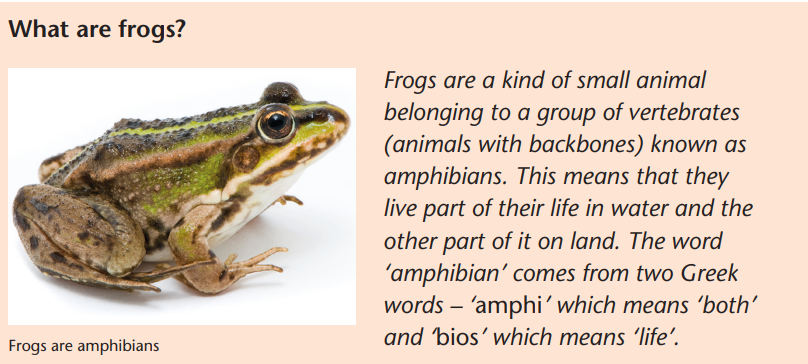
Amphibians are cold-blooded animals. This means that their body
temperature is the same as the surrounding temperature. Their skin absorbswater into their body so they do not have to drink water to survive.
Frogs are special. They can breathe by means of their lungs and also
through their skin. This is because of the way their heart is formed. It has
three chambers instead of the normal four. Frogs have strong hind legs to
enable them leap great distances. The front legs or arms are short. Theyare used to prop the frog up when it sits.
How big is the biggest and how small is the smallest?
The largest frog is the giant or Goliath frog of West Central Africa. It can
grow to more than 30 cm long. The largest frog in America is the bullfrog.It can grow to more than 8 cm long.
The smallest frog in the Southern Hemisphere is the Brazilian Gold Frog at
9.8 mm long. In the Northern Hemisphere, the smallest frog is the
Monete Iberia Eleuth, discovered on a mountain in Cuba in 1996. Theymeasure about 9.6–9.8 mm long.
Where do frogs live?
Frogs can be found almost anywhere, except in Antarctica. However, most
species are found in tropical regions. More frogs are found in warmercountries.
You can find frogs in water or near places that have water, like ponds and
streams. Some frogs never enter the water. They live mainly on land andonly go to the water to mate.
Then, there are some kinds that live in trees. These frogs have tiny sticky
pads on their fingers and toes to help them cling to the tree trunk as theyclimb.

Activity 5: Make notes on frogs
1. There are three subheadings under the main heading of the reading. Write
down the main heading and the subheadings.
2. Make notes of the important information under each subheading. Use
numbers.3. Compare your notes with the rest of the class.
Activity 6: Use numbers to put facts in order
Here is a simple recipe for a beef burger. The instructions are all mixed up. Put
them in the right order and number them. Compare your answer with theperson sitting next to you.

Instructions
• Place the onions in the centre of each foil piece. Fold foil over onions so that
the edges meet, and place on the coals.
• Cut the bread rolls in half and place the patties on the rolls with the onions
on top.
• Grill the onion packets and beef patties for 10 to 15 minutes, turning the
patties and rotating packets once or twice.
• Heat coals or gas grill for direct heat.
• Spray two 30 × 45 cm sheets of heavy-duty foil with cooking spray.• Brush beef patties with steak sauce.
Grammar focus
Recounting
Recounting is a way of retelling an important event, or describing an experience.
When we recount an event, it is usually written in the order in which thingshappened. This is called chronological order.
To do this, you will have to use time connectives such as:
firstly next
then after that
meanwhile eventually
later finally
Example:
World War II, also known as the Second World War, was a global war that lasted
from 1939 to 1945. Firstly, Adolf Hitler invaded Poland in 1939. After that, the
war dragged on for six deadly years. Finally, the Allies defeated both NaziGermany and Japan in 1945.
Activity 7: Recount an event that happened last week
Write four lines recounting an event that happened last week.
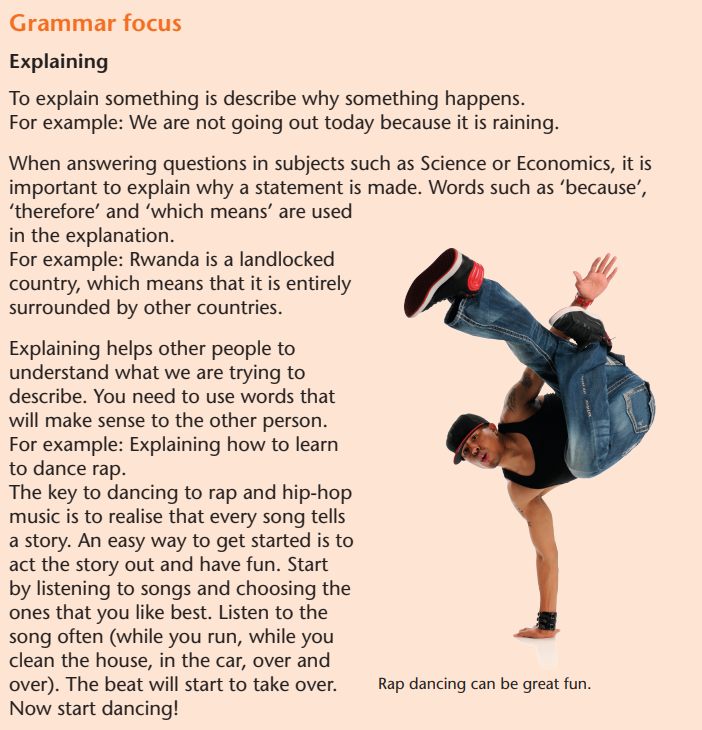
Activity 8: Explain how to play a sport
In pairs, take turns to explain to each other how to play your favourite sport.
You should tell each other whether the explanation was easy or difficult tounderstand.
Activity 9: Practise definitions
Grammar focus
Defining Words/ Expressions
Defining means making something very clear or explaining what it means. It can
be used as an instruction in a question set by your teacher, for example:
• Define photosynthesis.
• Your tasks are defined in the instruction at the top of the page.
The word ‘defining’ can also be used to pinpoint an action or event that was
very important. For example:
Winning the triathlon was the defining moment of his school career.
Other ways of defining Word and expressions:
• Use of “Be”, consist, mean, ..: eg. Business is taking risks.
• Use of defining clauses: - eg. A pen is a tool that we use to write with.
• Use of Aposition:
• Rwabugiri, a recent Rwandan traditional leader, conquered big territories.
• Gacaca, civil court of Rwandans by rwandans, reconciled many people.
• Use of some punctuations: colon(;), semi-colon(;), comma(,), Full Stop(.)
Frog: small amphibian
People like music. It stirs their hearts
• Use of words expressing reason: because, as, for, for example, …Eg. People like music because stirs their hearts.
Reread the text on frogs, then complete the following questions.
1. Define the word ‘amphibian’.
2. Define ‘vertebrates’.3. Complete the following sentence: A defining moment in my life was when
Grammar focus
Giving examples
When we are explaining new information, it is useful to give examples of what
we are describing. Throughout this book, examples are given to you of grammar
that you need to learn. When you are writing an examination, it is a good
practice to give examples of any facts or statements that you make. This provesto the marker that you understand what you are writing about.
Example:
Amphibians are animals that live part of their life in water. An example of anamphibian is a frog.
Activity 10: Give examples
Complete the following sentences:
1. Rwanda has many mountains, one example of which is ______________ .
2. Examples of foods eaten in Rwanda are ______________ and
______________.
3. An example of a team sport is ______________ .
4. There are many birds in Rwanda; two examples are ______________ and
______________ .5. I have many friends, for example ______________ .
Grammar focus
Contrasting means comparing one thing with another thing that is very
different. Contrasting clauses make two statements, one of which contrasts with
the other, or makes it appear unexpected or surprising.
In the examples below, notice the differences in meaning between the clauses in
each sentence.
• Kim and Tom do not like the same music but they both like to dance.
• Wool is not man-made, but human beings make rayon.
Some contrasting clauses are introduced by conjunctions such as ‘although’,
‘yet’, ’even though’ or ’while’.
Example:
• Although Mrs Sims had lived in China all her life, she knew very little
Chinese.• George runs three kilometres daily, yet his brother Paul hates to exercise.
Activity 11: Make contrasting sentences
Use the clauses in brackets to make contrasting sentences:
1. (The summer season is wet and hot), _____ (the winter season is cold and
dry).
2. (Some dogs are well-behaved) _____ (others drag their owners down the
block, yapping all the way).
3. ______ (the boy was injured), (he didn’t give up).
4 (There was little chance of success), ________ (we didn’t give up).5. (He is overweight) _____ (he still runs very fast).
Grammar focus
Listing
When explaining or describing, examples often need to be listed. If you look
back at Activity 6, you will notice that you had to list the instructions in the
correct order. In listing, we make use of commas and words such as ‘firstly’,
‘secondly’, then' and ‘finally’, or we can just use ‘first’, ‘second’, ‘third’, andso on.
Example:
We went to the shops today. First, we bought apples. Next, we bought new
shoes and then we bought pencils and pens. Finally, we bought coffee.We could also use a colon and combine the sentences.
Example:
We went to the shops today and bought the following: apples, new shoes,pencils, pens and coffee.
Activity 12: Make lists
Make listing sentences out of the following:
1. I grabbed a spoon. I ate the cereal. I drank the milk. I tossed the bowl in
the sink.
2. We learn how to cook. We learn how to clean.
3. How to become a political leader: ______, you need to become a leader of a
political party. ________, you need to win a seat in Parliament. _________,
your party must have a majority of seats.
4. Buying organic fruit and vegetables is a better choice. ________, they are less
contaminated by chemical pesticides. __________, they are not genetically
modified. ____________, they are allowed to mature or ripen fully.
5. Soil has three main layers. ________, there is the surface layer. ____________,there is the topsoil. _________, there is the subsoil.
School language functions
A language function is the purpose for which a certain phrase or
sentence is being used. At school, we use language for different
purposes or functions.
1. There are common phrases used for purposes of greeting, like:
Good morning.
How are you?
2. For purposes of apologising, we use:
I am sorry.Please forgive me.
3. For introducing ourselves, we can say:
My name is _______ .
How do you do?
4. To give warnings and instructions, these sentences can be used:
Do not speak while the teacher is speaking.
Never go out without permission.
5. For interruptions and making requests, we can say:
Excuse me.
I beg your pardon.
6. During assessment or examination, these words could be used:
Describe ______ .
Discuss ______ .
7. When the teacher wants a response, he or she could say:
Class, do you agree?
What do you think about _____ ?
8. Common instructions from the teacher are:
Sit down.
Be attentive.
9. When the teacher is encouraging you, he or she might say:
That’s very good.Good work.
Activity 13: Practise common school language

Activity 14: Comprehension
Reread the text ‘Read about wanting to be head girl’ and answer the following
questions.
1. What are the words Penny uses before she enters the principal’s office?
2. How does the principal respond?
3. Write down a greeting that your teacher could use with a class at the
beginning of the school day.
4. What would be a polite thing to say if you bump into someone?5. How would you introduce yourself to a new class member?
Vocabulary, spelling and pronunciation
Activity 15: Use the glossary
Use the glossary to look up the following words and write them in your exercise
book with their meaning.
evaluate assumptions
summary fictional
abbreviation chronological
Assessment
1. Fill in the blanks:
There are good reasons why some people feel the need to make
significant changes in their lives from time to time. _______, any
new situation that a person encounters can be an opportunity to
learn and grow as a person. A new job, for instance, might present
challenges that push the person to adapt, acquire new knowledge, or
add to his or her skill set. ________, a change can represent a break
with the past and an old routine, which has become boring and
predictable. _______, as well as making life more fun and interesting,
new experiences can be good for our physical and mental health.
(3 marks)
2. In Unit 6, we have learned about the following eight study skills:
listing, describing, recounting, giving examples, making notes,
using instructions, contrasting and defining. Make eight sentences,
giving an example of each one. (8 marks)
3. Give three reasons why group work is a useful exercise. (3 marks)
4. Rewrite the following paragraph using the correct grammar and
punctuation:
too many pupils look at studying as something they have to do not
as an enjoyment or opportunity to learn That's fine but researchers
have found that how you approach something matters almost as
much as what you do Being in the right mindset is important in
order to study smarter (6 marks)
Total (20)
